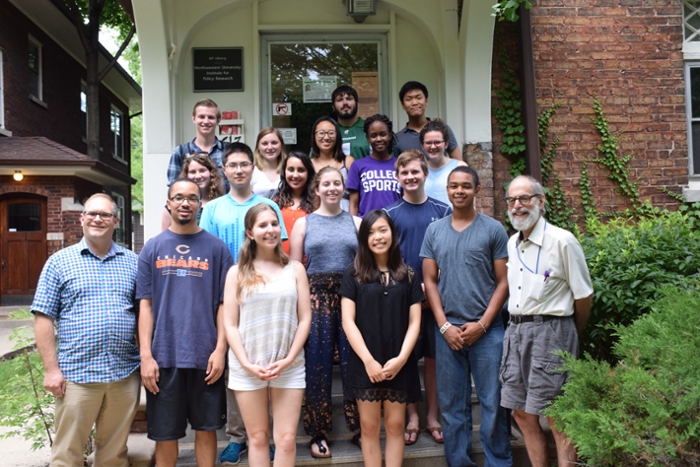Undergraduates Tackle Research, Prepare for ‘Knowledge Society’
IPR program opens door to career-enhancing opportunities
Get all our news

Some of IPR's 2016 Summer Undergraduate Research Assistants with David Figlio (far left) and James Rosenbaum (far right).
For Ross Chu (WCAS ‘17), learning how a research project gets off the ground was one of the most informative parts of IPR’s Summer Undergraduate Research Assistants (SURA) program.
“When you take data science classes at Northwestern, a professor just gives you this perfectly clean dataset, but research doesn’t really work that way,” Chu said. “This was a great opportunity to learn about the underground work that goes on to produce impactful research.”
IPR’s SURA program, started in 1998, gives students first-hand experience in the conceptualization and conduct of policy-relevant social science research, including historical, qualitative, and statistical projects. The program starts off with a course in statistical computing, and students spend the rest of the time working on real-time research projects with some of the nation’s top and rising social scientists.
In 2016, Chu spent his summer working with IPR Director David Figlio, an education economist, on a project investigating how crisis events, ranging from hurricanes to terrorist attacks, affect immigrants. Building on research conducted with Figlio, Chu is turning the project into his senior thesis.
Ali Pelczar (WCAS’ 17), also extended her project from summer 2016 with IPR developmental psychologist Lindsay Chase-Lansdale into a senior thesis, examining low-income mothers’ persistence in education. For her, the program was key in figuring out what to do after graduation.
“I was thinking about working with policy research, but I wasn’t sure what that looked like or what kinds of opportunities were available,” Pelczar said. “Long term, I definitely want to keep doing things similar to what I’ve been doing here.”
But even for students not interested in a career in research, the program can be valuable, according to IPR education researcher James Rosenbaum, who directs the program.
“This isn’t just for people who want to be PhDs,” he explained. “It’s about learning a way of thinking. We live in a knowledge society, and knowing how to collect good information that is reliable and valid, and how to analyze it, is key for so many things.”
Past students have gone on to work in consulting and finance or attended law or medical school, with some even continuing on to pursue their PhDs in the social sciences.
For students thinking about applying for SURA, Chu advised having “an open mind” about learning new things. He also recommended looking into different faculty members’ research to find work that is of interest to the student.
“SURA is a great source for students to be engaged in research,” he said. “It’s definitely been an intellectual challenge—there are so many ways you could tackle a question.”
Published: March 2, 2017.